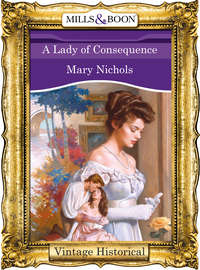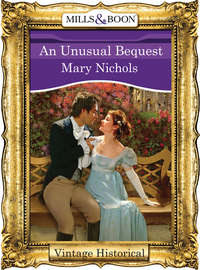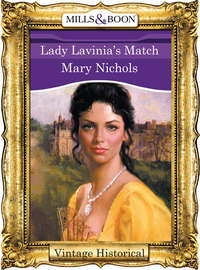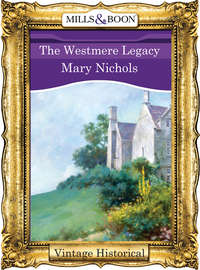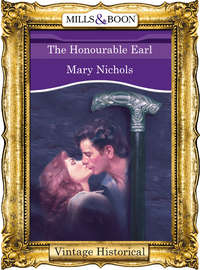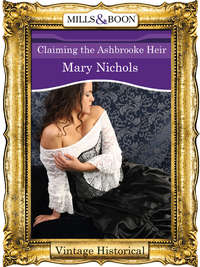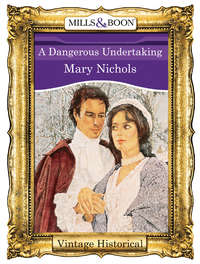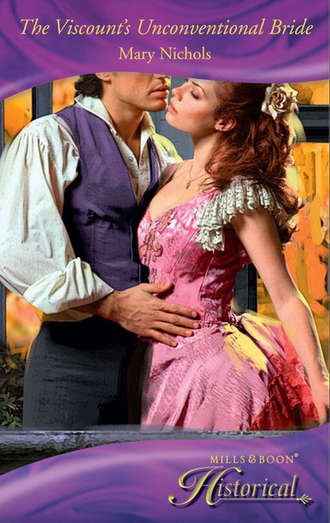
Полная версия
The Viscount's Unconventional Bride
‘I can understand that,’ James said. ‘And she left no clue as to her intentions?’
‘No, though she did leave a note telling our parents not to worry and she would soon be back…’
‘There! I said she had run away with a lover,’ Ash said.
‘No, she has not. I wish you would treat the matter seriously.’
‘We are treating it seriously,’ James assured him. ‘But we exist to track down criminals. If no crime has been committed…’
‘Please make an exception in this case. She would not willingly have worried our parents by staying away all night. We think something dreadful must have happened to her. Help us to find her, I beg of you,’ Luke said desperately.
‘This seems like a job for you, Jonathan,’ James said at last. ‘But you must lose no time or the trail will have gone cold.’
Jonathan rose to obey. ‘How did you arrive here?’ he asked Luke.
‘I rode.’
‘Good. I will ride back with you at once. Let us hope the crowds are not so thick now…’
They could not ride side by side until they had passed the Tyburn gibbet. The hanging had been accomplished and the body taken down, but some of the crowd still milled about, talking about it, buying mementoes, waiting to see if there would be any other convicts to meet the same fate. There was usually more than one dispatched on hanging days. As soon as they were on the open road and the noise behind them had faded to a distant hum, Jonathan questioned Luke more closely about his sister’s disappearance. Had anything happened to trigger it off? Had she been unhappy at home? Had she expressed a desire to visit friends or relations? To all of which the young man was noncommittal. And when he asked for a description of Louise, the only reply Luke made was, ‘Oh, she is beautiful.’
‘That is not much help. What does she look like? Is she tall or short? Fat or thin? What is the colour of her hair and her eyes?’ He still had that hazy memory of the little girl in church, in a blue dimity dress with a huge blue bow in her hair. It had been thick, curly hair, he recalled.
‘She is tall for a woman, I suppose, and slim. Her hair is brown, but not an ordinary brown. It has a special sheen to it. Her eyes are…’ He stopped to think. ‘Green, I think. Or perhaps they are brown. Do you know, I cannot be sure.’
‘No distinguishing features?’
‘She don’t wear patches. Nor powder. Nor a wig. Don’t need ‘em.’
It was as much as he could expect; brothers never were very observant when it came to sisters, though they might describe their mistresses perfectly well.
When they arrived at the Barnet vicarage, he was greeted by a sombre cleric and a woman beside herself with grief. He was of average height and breadth, wearing a bag wig and spectacles. She was approaching fifty, a small, neat woman, with greying hair and pale greeny-grey eyes. The pair appeared to be out of sorts with each other, but endeavoured to set aside their differences to offer him refreshment and answer his questions. They could only repeat what Luke had told him, that Louise intended to go because she had left a note, but that was understandable since everyone was out and would wonder what had become of her; it only said she would not be gone long and would soon be back. They did not, for a moment, believe she meant to worry them to death. She was a madcap, always ready for adventure, her brothers had seen to that, but that did not mean she was unfeeling. She would not hurt a fly, let alone her family, all of whom loved her.
‘Might I see the letter?’ he asked.
Mrs Vail fetched it for him. It was very creased and tear-stained. Dearest Mama and Papa, they say eavesdroppers never hear good of themselves, but I could not help listening, so you will understand why I have to make this journey, but I shall not be gone long, so do not worry about me. I promise I will be back as soon as I can. Your very affectionate Louise.
‘What was it she overheard?’ he asked.
‘It was nothing,’ Mrs Vail said. ‘My husband and I were talking. The window was open and she was weeding the flower bed. We had no idea she was there.’
‘Whatever it was would have made her unhappy?’
Husband and wife looked at each other as if unwilling to answer and it was left to Luke to reply. ‘She was always cheerful. She had nothing to be unhappy about.’
Jonathan felt sure they were hiding something; Mrs Vail was particularly uneasy. ‘What time did you go out and what time did you return?’
‘It was the middle of the morning,’ the Reverend said. ‘I had to visit a parishioner who was dying and took the gig. I gave my wife a lift into Barnet to do some shopping and arranged to meet her at a friend’s house to bring her home. It was about five in the afternoon when we returned.’
‘And young Mr Vail?’ Jonathan queried, turning to Luke.
‘I was out riding. I arrived home just before my parents, but I did not think anything about Louise being missing, until my mother became worried.’
‘So the house was empty for five hours. May I question the servants?’
‘Certainly, you may,’ the Reverend told him. But I have already spoken to them all myself.’
‘I am sure you have, but they might have remembered something more.’
Jonathan swallowed the tea he had been given while the servants were summoned. One by one they denied any knowledge of Louise’s whereabouts or any intention she might have had to leave home. He asked and was given permission to examine the garden and speak to the outside servants. A young man weeding a flower bed looked up as he approached. He assumed he was the young gardener Luke had mentioned.
‘I believe you saw Miss Vail before she left,’ he said. ‘I have been asked by the Reverend to help find her.’
‘Yes. She was acting strange and so I told them, but I never spoke to her. I wish I had, ‘cos when I went home I discovered my sister had disappeared too.’
‘Your sister? Do you think they are together?’
‘I reckon they must be. Miss Vail would never be so foolish as to go anywhere but the village all on her own. An’ Betty left a note sayin’ she was goin’ on an adventure an’ it was a great secret and I wasn’t to tell a soul, but when I saw ‘ow worried Mistress Vail was, o’ course I told her. It seemed to ease her mind. It vexes me, that it does. Betty shouldn’t never ‘ave agreed to go, and I’m worried about her too.’
‘You did right to speak out. How many outdoor servants are there here?’
‘Only me and the coachman, Jaggers. You’ll find ‘im in the stables.’ He pointed in the direction of a group of outbuildings.
Jaggers, it appeared, had been with the family man and boy and he could tell his lordship all about the boys and their little sister. ‘Spoiled, she were,’ he said, ‘though not in bad way. She was the sunniest little thing you could imagine and a welcome daughter after three boys. They treated her like one o’ theirselves, always ready for mischief and for a dare.’
‘They have not always lived at Chipping Barnet, have they? I seem to remember an earlier incumbent when I was a boy.’
‘They come from Yorkshire. I were with them then, came along o’ them when they moved. Drove the carriage for them.’
‘Whereabouts in Yorkshire?
‘Moresdale.’
‘Could Miss Vail have gone there?’
The old man shrugged. ‘She were askin’ me about it earlier in the day, but then she was always full o’ questions. I didn’t think anything of it.’
‘When? What time?’
‘About noon, as near as I c’n say.’
‘Was she agitated?’
‘No, just talking, as if she were interested like, while she groomed her mare.’
‘But she didn’t take the mare out?’
‘No. An’ she couldn’t ‘ave asked for the gig because the Reverend had it out.’
‘So, either she was walking or she meant to take the stage.’
‘If she have bin so foolish as to attempt the stage, I fear for her, that I do, what with the terrible state of the roads and the chance of being attacked and robbed. I hopes you can fetch her back and no harm done, my lord.’
Jonathan thanked him and returned to the house where he found Mrs Vail alone in the parlour. ‘Ma’am, I have just been speaking to your coachman. He tells me that you moved here from Moresdale.’
‘Yes, we did. Fifteen years ago now.’
‘Do you think your daughter might be attempting to go back there?’
‘She does not know where it is. She was only five when we moved down here. I doubt she would remember it. And why would she want to go back there?’
‘I do not know, but perhaps you might hazard a guess?’ It was said meaningfully. ‘Why, for instance, did she abandon her gardening clothes on the flower bed? It seems to me that something startled her. Can you tell me what that could have been?’
‘No, my lord.’
‘Cannot or will not?’
‘Cannot. I beg you not to ask.’
The lady was so nervous, Jonathan was sure she was hiding something. ‘Madam, I will do what I can to find your daughter, but it is necessary for me to know everything, you understand? I cannot work in the dark.’
‘My lord, forgive me, I am not myself.’ She seemed to gather herself with an effort of will. ‘All I can tell you is that we were talking of the place where Louise was born and that might have aroused her curiosity, but I can hardly believe she would try to go there. She has never travelled anywhere on her own before. It is two hundred miles away and goodness knows what at the end of it—’ She stopped suddenly as if conjuring up some dreadful calamity in her mind’s eye that she could not put into words.
He decided she was afraid of something else beside the hazards of the journey. ‘Nevertheless, you do believe that is where she is heading?’
‘Perhaps.’ It was said reluctantly.
‘Does she have any money? She will not go far without it.’
‘The Reverend gives her pin money…’
‘How far will that take her?’
‘I do not know. She has little reason to spend it. Furbelows and fancy ribbons never appealed to her, so she may have a little saved. And…’ She stopped and swallowed hard. ‘I fear she sometimes plays cards with Luke and his friends and is always boasting of how much she has won.’
He almost laughed aloud at the thought of a vicar’s daughter gambling, but restrained himself. It was not a time for laughter. ‘How much has she won?’
‘I have no idea. It is only a little fun, but if my husband were to hear of it he would be very angry. I cannot think it amounts to more than a few shillings.’ She was unhappy about his questioning and wished to bring it to an end. ‘Go after her, my lord, please, bring her safely back to us.’
‘I will do what I can to find her, but short of tying her up and carrying her off, I cannot force her to return, you understand.’
‘Yes, but do your best to persuade her, I beg you. But whatever you do, please see she comes to no harm.’
He was still not completely satisfied, but he did not think he would get anything more out of her and took his leave. Finding runaway daughters was not the sort of thing the Club took on, but there was no time to go back and consult James, who in any case had gone home to be with his family, so it was up to him to decide whether to proceed. There was a mystery here and if the law had been broken, then that was reason enough. Besides, he was intrigued.
‘I don’t know why we ‘ad to go all the way to Lunnon, only to come straight back ag’in,’ Betty said as the coach drew up at the Red Lion in Barnet. ‘You changed yer mind, Miss Louise?’
‘Shh,’ Louise whispered, glancing at the other passengers to see if they had heard, but the noise of the horses being changed and the ostlers and coachmen shouting to each other had drowned her voice. ‘I am not Miss Louise. I am Mr Louis Smith. And you are Mrs Smith. Call me Lou, like I told you. And in answer to your question, no, I have not changed my mind. We could not have boarded the coach here, everyone knows us.’
Betty giggled. ‘Not like that, they wouldn’.’
Louise looked down at herself. She was wearing a pair of breeches, which had once belonged to one of her brothers, tucked into her own riding boots, a blue wool coat with enormous pockets and pearl buttons, a long matching waistcoat, a white linen shirt and a black neckcloth, all once worn by one or other of her brothers. Her hair was tied back in a queue such as military men adopted and fastened with a slim black ribbon and topped by a tricorne hat. The ensemble was completed with a sword belt into which she had put Matthew’s small sword; since becoming a parson he had ceased to carry a weapon. And into the capacious pocket of the coat she had put a pistol, which she had taken from a drawer in Luke’s room, along with a pouch containing ball, powder and tinder. She was a good shot, but had never aimed at anything but a target and doubted she would have the courage to use it in any other circumstances. But having it made her feel a little safer, more manly.
The disguise was the result of much soul searching the day before on how best to travel. She felt she would be safer as a man and she knew there were some old clothes of her brothers stored in the vicarage attic, but even in men’s clothes the prospect of going alone had daunted her, although not enough to make her turn from her determination to make the journey. And she knew roughly where to go. Jaggers was a talkative man and liked to tell her tales of his boyhood in Yorkshire and how he had been taken on by the Reverend, ‘afore he come down south’ as he put it. He hardly needed encouragement and she soon had a place name, the one she had heard her mother mention, though he had no idea exactly where it was in relation to Barnet. ‘Moresdale is a fair distance,’ he said. ‘T’other side of York. It were where you were born, Miss Louise.’ She wondered if he knew the truth, but she couldn’t go round asking everyone she met if they knew she was not her father’s daughter.
She had been leaving the house with a portmanteau containing her disguise, together with some feminine clothes she would need when she arrived, when she became aware of Alfred Rayment, their young gardener, watching her. She thought her adventure had been foiled before it began, but he did not seem particularly curious and she supposed it was because she often took items of clothing to the village in a bag and he would think nothing of it if she acted naturally. She smiled and went on her way.
It was then she hit upon the idea of asking his sister if she would accompany her. Alfred and Betty lived in a cottage on the other side of the village. Betty was seventeen, a couple of years younger than Alfred, and acted as his housekeeper. They had no parents. She had a round, rosy face, blue eyes and thin pale hair. She was always clean and neatly dressed. When asked if she would like to go, she had become as excited as a child. ‘I ain’t ever left home afore,’ she had said. ‘It’ll be summat to tell me children, if’n I was ever to find m’self a husband.’
It solved another problem for Louise—where and how to change into her disguise. Betty thought it was a huge joke and Louise did not tell her it was very far from a joke.
‘Perhaps not, but I could not take the risk leaving dressed as a woman,’ she said in answer to her friend’s comment. ‘We would never have got away if someone had recognised me and told the Reverend.’
The girl was in her best dress, the bodice of which was laced across her stays and the neck filled with a cotton fichu. They were an unprepossessing couple, but that suited Louise’s purpose. ‘Yes, but why did we have to go all the way to Lunnon first,’ Betty persisted. ‘I never bin in such a frightenin’ big place afore.’
Never having travelled by public coach and having little idea where they habitually stopped, they had walked towards London, carrying their bags. It soon became obvious to Louise they must find transport. Their bags, though containing the minimum possible, were heavy and it would not be long before she was missed and being searched for. To be found on foot within half-a-dozen miles of home would be the ultimate humiliation. They had stopped a carrier’s cart and asked the driver for a lift. He had taken them right into the heart of the Capital and directed them to the Blue Boar in Holborn where, so he told them, they could pick up a coach to almost any destination they cared to name.
But there had been no coaches leaving for the north until the morning. They had walked about all night, not daring to ask for a room anywhere, and at dawn had made their way to the inn and paid their fare to York. Louise was taken aback by the amount she had to pay; three guineas left little for bed and board on the way and she feared her small savings would not last and she might have to sell what little jewellery she had. She had no idea how to go on after they reached York, but she told Betty, as confidently as she could, they would cross that bridge when they came to it.
She was almost holding her breath in case someone whom she knew boarded the coach at Barnet, but no new passengers claimed seats and the original four were soon on their way again. The die was cast. She was going to find Catherine Fellowes and then she might have her questions answered. It had briefly occurred to her that the lady might no longer live in Moresdale even if she ever had; she could not even be sure of that. She might have moved away, or even died. Louise hoped not; it would be sad never to have known her. She would never find out if she did not go, would she? Curiosity had always been one of her characteristics, but this was more than curiosity; this was a need to discover her identity. But it did not mean she wanted to leave the loving couple she would always look upon as her parents; she would come back. She had said so in her letter. She hoped they understood that this was something she had to do and it did not mean she loved them any less.
She settled back in her seat, prepared to sleep if she could, and advised Betty to do the same. ‘We have been awake all night,’ she whispered, with one eye on the couple sitting opposite them. ‘And if we are asleep, no one will engage us in conversation, will they?’
Most of the roads close to the metropolis had been turnpiked, but even those had been churned up by heavy wagons in winter and baked into ruts in summer. They were jolted from side to side and sleep was almost impossible. They passed through Hatfield, changed horses at the Duke of York at Ganwick Corner, then again at Stevenage without incident and were approaching Baldock when it happened.
Louise was drowsing, but was jolted fully awake by the shout of the guard and the coach being pulled to a sudden stop, followed by the sound of a gun being fired.
‘Highwaymen!’ she gasped, as the door was wrenched open and a black cloaked figure wearing a mask and brandishing a pistol ordered them out on to the road.
Chapter Two
Jonathan left the vicarage and rode to Chaston Hall, which was only eight miles distant, where he kept his coach and carriage horses. Finding a standing for them in London was difficult and his father’s estate in Barnet was large enough for them to be no trouble to him and near enough to the capital for him to send for them if they were needed.
He told his parents he would be away some time on the Society’s business, though he did not explain the nature of the business. And though they decried his secretiveness, they had become used to it. They bemoaned the day he had ever met James Drymore and his band of gentleman thieftakers. If it were not for them, he would be dancing attendance on the year’s hopefuls at London’s society balls and finding himself a wife. He would not find one chasing all over the countryside after criminals. At twenty-five, it was high time he set up his own establishment; his bachelor rooms in town did not count.
He smiled politely and allowed them to go on for some minutes before excusing himself and hastening out to the stables to tell Joseph Potton to harness up his travelling coach. He might be quicker on horseback, but if and when he caught up with the runaway he would need a vehicle to convey her home. ‘You and I are going alone,’ he told Joe. ‘Take a change of clothes, I do not know how long we will be gone.’
Joe grinned. ‘Chase ‘em and nab ‘em business, m’lord?’ he queried, using his own name for the Society. He was a sturdy twenty-year-old, though sometimes he behaved like someone twice his age, which was hardly surprising considering he had been born in poverty without a father and with a mother who turned him out when she was entertaining her men friends. The courts and alleyways of Ely had been his home. He would still be there if James had not rescued him and given him an education to fit him for a life in service. It was on James’s recommendation Jonathan had taken him on.
‘Yes, now make haste—we have not a moment to lose.’ The young lady had a day’s start and must be well on her way by now. In Jonathan’s favour was the fact that he had a far superior vehicle and was prepared to drive through the night, which the public coach would not do.
He left the boy to do his bidding while he went to his room to supervise his packing and console Hilson, his valet, for not taking him too. He changed swiftly from his silk coat, waistcoat and breeches and his lacetrimmed shirt into something resembling a yeoman farmer: brown stuff breeches tucked into sturdy boots, dark brown wool coat over a long narrow waistcoat and flat-crowned felt hat. He had never worn a wig and his own hair was tied back in a queue. The whole outfit horrified Hilson and though he had seen it before he bewailed that his young master should so far forget his rank and dignity as to dress like one of his father’s hired labourers. Jonathan simply laughed and pointed out he would not have the embarrassment of dressing him if he did not accompany him. Even so, he did allow the man to pack some decent clothes for him in case it became necessary to revert to being the Viscount. He heard the coach being brought to the front door and, picking up his bag, raced down and climbed in.
While daylight lasted, they made good time and had passed through Stevenage and were approaching Baldock, in the gathering twilight when Joe pulled the horses to a halt. Jonathan stuck his head out of the door. ‘What’s up?’
‘Something blocking the road ahead, my lord. A coach I think. Oh, lor’, it’s a hold-up!’
Jonathan left the carriage and climbed up beside Joe, the better to see. There was no doubt of it; the coach ahead of them was being searched by armed robbers. One had his head and half his torso in the coach searching it while its passengers stood on the verge being guarded by a second man with a pistol.
Jonathan, who always travelled with a pair of loaded pistols against such an eventuality, withdrew them from his pocket and urged Joe to spring the horses and make as much noise as he could.
Joe enjoyed doing that and between them they managed to make it sound like a cavalry charge. Joe brought the horses to a shuddering halt only inches from the back of the coach. Jonathan stood up on the box and fired his pistol at the gun hand of the man guarding the passengers. It flew from his hand. He swore and put his injured hand to his mouth. The man who had been searching the coach emerged and stood beside it empty-handed. ‘Stand still if you value your life!’ Jonathan commanded, aiming his second pistol at him, at the same time handing the first to Joe to be reloaded, which was done in record time. It was a routine they had practised many times and it meant he nearly always had a loaded weapon to hand. The robbers, seeing themselves outmanoeuvred, gave themselves up.
‘Thank you, sir,’ the coachman said, looking daggers at his guard, whose blunderbuss lay undischarged on the seat. ‘A most timely intervention. We are in your debt.’
Joe, the coachman and the guard tied the men securely with spare cord usually used to secure luggage on the roof, and bundled them into Jonathan’s carriage, while he turned to see if the passengers had been hurt.
‘You are to be congratulated, sir,’ a gentleman in the plain black suit of a cleric told him. ‘Such presence of mind I have rarely met. I am persuaded you are a military man?’




